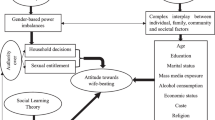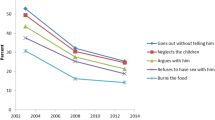Abstract
The study examined the extent of wife-beating acceptance and factors that influence women’s attitude towards wife-beating in Ethiopia from a nationally representative sample of 11,658 participants in the 2011 Ethiopian Demographic and Health Survey. Multivariate logistic regressions were fitted to investigate the relationships between women’s attitude towards wife-beating and women’s decision-making autonomy after controlling for socio-demographic factors. The majority (56%) of women agreed that wife-beating is justified when wife neglects children, 53% when wife burns the food, 50% when wife argues with husband, 48% when wife goes out without telling husband, and nearly 45% when wife refuses to have sex with husband. Overall, 51% of women had shown highly favorable attitude towards wife-beating. Women’s place of residence, household wealth quintiles, educational levels, marital status, and husband/partner’s employment status have shown significant association with women’s attitude towards wife-beating. Women’s decision-making autonomy was also a significant predictor of women’s attitude towards wife-beating. The odds of having highly favorable attitude towards wife-beating deceased significantly as the level of decision-making autonomy of women improved. Given the widespread acceptance of wife-beating among Ethiopian women, social policies that empower women could serve as a positive force in changing attitudes towards wife-beating and violence against women.
Similar content being viewed by others
References
Devries KM, Mak JY, García-Moreno C, Petzold M, Child JC, Falder G, Lim S, Bacchus LJ, Engell RE, Rosenfeld L, Pallitto C. The global prevalence of intimate partner violence against women. Science. 2013;340(6140):1527–8.
CDC. Intimate partner violence: definitions. 2016. http://www.cdc.gov/ViolencePrevention/intimatepartnerviolence/definitions.html Accessed 6 Oct 2016
WHO. Women’s health. 2013. http://www.who.int/mediacentre/factsheets/fs334/en/ Accessed 5 Oct 2016
Campbell JC. Health consequences of intimate partner violence. Lancet. 2002;359(9314):1331–6.
Garcia-Moreno C, Jansen HA, Ellsberg M, Heise L, Watts CH. Prevalence of intimate partner violence: findings from the WHO multi-country study on women’s health and domestic violence. Lancet. 2006;368(9543):1260–9.
Semahegn A, Mengistie B. Domestic violence against women and associated factors in Ethiopia; systematic review. Reprod Health. 2015;12(1):1.
WHO. Preventing intimate partner and sexual violence against women: taking action and generating evidence. Geneva: World Health Organization, 2010.
Moghadam VM. From patriarchy to empowerment: women’s participation, movements, and rights in the Middle East, North Africa, and South Asia. Onondaga: Syracuse University Press; 2007.
Jewkes R. Intimate partner violence: causes and prevention. Lancet. 2002;359:1423–9.
Ofcansky TP, Berry L. Ethiopia: a country study. Washington: GPO for the Library of Congress; 1991.
UNWOMEN. Advancing gender equality: promising practices-case studies for the millennium development goals achievement funds. 2016. http://www.unwomen.org/mdgf/B/Ethiopia_B.html. Accessed 6 Oct 2016.
CSA & ICF International. The Ethiopia: demographic and health survey 2011. 2016. https://dhsprogram.com/pubs/pdf/FR255/FR255.pdf. Accessed 29 Sept 2016.
Rani M, Bonu S, Diop-Sidibe N. An empirical investigation of attitudes towards wife-beating among men and women in seven sub-Saharan African countries. Afr J Reprod Health. 2004;1:116–36.
Bariagaber H. Correlation analysis of attitudinal responses of men and women toward wife-beating by husband in rural and urban Ethiopia. Sociol Study. 2014;4(7):601–14.
Hindin MJ. Understanding women’s attitudes towards wife beating in Zimbabwe. Bull World Health Organ. 2003;81(7):501–8.
National Planning Commission and the United Nations in Ethiopia. Millennium development goals report 2014: Ethiopia. Assessment of Ethiopia’s progress towards the MDGs. 2016. http://reliefweb.int/sites/reliefweb.int/files/resources/EthiopiaMDG%202014%20Final%20final.pdf. Accessed 2 Oct 2016.
McLellan-Lemal E, Toledo L, O’Daniels C, Villar-Loubet O, Simpson C, Adimora AA, Marks G. “A man’s gonna do what a man wants to do”: African American and Hispanic women’s perceptions about heterosexual relationships: a qualitative study. BMC Women’s Health. 2013;13(1):27.
Abramsky T, Watts CH, Garcia-Moreno C, Devries K, Kiss L, Ellsberg M, Jansen HA, Heise L. What factors are associated with recent intimate partner violence? Findings from the WHO multi-country study on women’s health and domestic violence. BMC Public Health. 2011;11(1):1.
Atteraya MS, Kimm H, Song IH. Women’s autonomy in negotiating safer sex to prevent HIV: findings from the 2011 Nepal demographic and health survey. AIDS Educ Prev. 2014;26(1):1.
Do M, Fu H. Is women’s self-efficacy in negotiating sexual decision-making associated with condom use in marital relationships in Vietnam? Stud Fam Plan. 2011;42(4):273–82.
Panda P, Agarwal B. Marital violence, human development and women’s property status in India. World Dev. 2005;33(5):823–50.
Atteraya MS, Gnawali S, Song IH. Factors associated with intimate partner violence against married women in Nepal. J Interpers Violence. 2014;30(7):1226–46.
Koenig MA, Ahmed S, Hossain MB, Mozumder AK. Women’s status and domestic violence in rural Bangladesh: individual-and community-level effects. Demography. 2003;40(2):269–88.
Sethuraman K, Lansdown R, Sullivan K. Women’s empowerment and domestic violence: the role of sociocultural determinants in maternal and child under-nutrition in tribal and rural communities in South India. Food Nutr Bull. 2006;27(2):128–43.
Tadesse M, Teklie H, Yazew G, Gebreselassie F. Women’s empowerment as a determinant of contraceptive use in Ethiopia further analysis of the 2011 Ethiopia demographic and health survey. DHS Further Analysis Reports. 2013;82.
Dugassa BF: Women’s rights and health: the case of Oromo women in Ethiopia. Healthc Women Int. 2005;26(2):149–69.
Acknowledgements
We would like to thank the Demographic and Health Survey (DHS) Program and ICF International for allowing us to use the database.
Funding
No funding was provided to the author, but only granted access to the data. Funding for EDHS 2011 was, however, provided by the HIV/AIDS Prevention and Control Office (HAPCO), the United States Agency for International Development (USAID), the United Nations Population Fund (UNFPA), the United Kingdom Department for International Development (DFID), the United Nations Children’s Fund (UNICEF) and the Centers for Disease Control and Prevention (CDC).
Author information
Authors and Affiliations
Corresponding author
Ethics declarations
Conflict of interest
All authors declare that they have no conflict of interest.
Ethical approval
We used secondary data from 2011 Ethiopia’s Demographic and Health Survey (DHS) after access was granted by the DHS Program. Ethical standards were followed and approved by the appropriate national committee.
Additional information
Authors contributed equally to this work.
Rights and permissions
About this article
Cite this article
Ebrahim, N.B., Atteraya, M.S. Women’s Decision-Making Autonomy and their Attitude towards Wife-Beating: Findings from the 2011 Ethiopia’s Demographic and Health Survey. J Immigrant Minority Health 20, 603–611 (2018). https://doi.org/10.1007/s10903-017-0592-6
Published:
Issue Date:
DOI: https://doi.org/10.1007/s10903-017-0592-6




